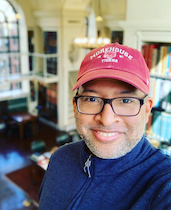Religion 360: The African American and Diaspora Experience — a Religious Interpretation
I am so excited to share with you the work of my students in this 2022 summer course at Northwestern. Each following post reflects the work of a student to do the following:
- Develop a theme (key term) addressed in class
- Write a brief narrative; and
- Include audio visual material

A religious interpretation of the Black and Africana experience in the United States can be examined through three themes: Recognition by or rejection of the U.S.; the meaning of Africa or Blackness for Black and Africana religions; and the binary of sacred versus secular in Black and Africana religions. African American religion has been marked by the tension created by inclusion and exclusion. Throughout the history of the Black Atlantic, Black religious movements emerged that sought greater acceptance and inclusion in U.S. life. Other Black religious movements, by contrast, developed their identities and practices based on a rejection of American identity.
One of the primary drivers of these distinctions in Black and Africana continues to be the question of what the “African” in religion and African American life means. Some unique movements, both Christian and Islamic, or what are called African Traditional Religions, have sought to define or retrieve an African cultural past for current religious practices. The term “African” pertains not only to debates and differences in highlighting a cultural past tied to the continent of Africa; it also refers to religion in the United States that is constantly reformed by the movement and migration of people groups.
Finally, the category of religion itself is at stake, as more and more Black and diasporic persons embrace labels like humanist, spiritual-but-not-religious, and not affiliated (or nones). These nontheistic and non-institutional labels open up forms of African American religiosity that embrace the practices and rituals of African American religions, but often for symbolic, cultural, or artistic reasons, do not demand adherence to these pre- scribed rituals, belief in a particular set of doctrines, or a commitment to certain communities of practice.
What is the relationship between African Americans, Diaspora and Religion? The categories of religion and race emerge within the encounter between Europeans and Africans in New World conquest and enslavement. This suggests geography, conflict, and the entanglement and or emergence of cultures offer a story of religion in spatial, relational and temporal ways. This course will trace religion as a mapping of space, a motion of time and a making sense of encounter of Black movement. Black Diaspora, a religious interpretation will therefore examine key words, or themes, such as: SOUL, SPIRIT, AFRICA, FREEDOM, SONG and more in a multi-sensory exploration of sound, sight, texts, tastes, ritual, resistance and more. This course will use readings, music, visual art and videos.

Marlon Millner, Ph.D. Candidate, Religious Studies, Instructor